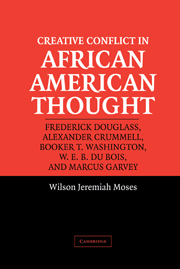Book contents
- Frontmatter
- Contents
- Acknowledgments
- Preface: Struggle, Challenge, and History
- 1 Introduction: Reality and Contradiction
- FREDERICK DOUGLASS: THE INDIVIDUALIST AS RACE MAN
- ALEXANDER CRUMMELL: THE ANGLOPHILE AS AFROCENTRIST
- BOOKER TALIAFERO WASHINGTON: THE IDEALIST AS MATERIALIST
- W. E. B. DU BOIS: THE DEMOCRAT AS AUTHORITARIAN
- MARCUS MOZIAH GARVEY: THE REALIST AS ROMANTIC
- CONCLUSION: RESCUING HEROES FROM THEIR ADMIRERS
- Index
1 - Introduction: Reality and Contradiction
Published online by Cambridge University Press: 07 November 2009
- Frontmatter
- Contents
- Acknowledgments
- Preface: Struggle, Challenge, and History
- 1 Introduction: Reality and Contradiction
- FREDERICK DOUGLASS: THE INDIVIDUALIST AS RACE MAN
- ALEXANDER CRUMMELL: THE ANGLOPHILE AS AFROCENTRIST
- BOOKER TALIAFERO WASHINGTON: THE IDEALIST AS MATERIALIST
- W. E. B. DU BOIS: THE DEMOCRAT AS AUTHORITARIAN
- MARCUS MOZIAH GARVEY: THE REALIST AS ROMANTIC
- CONCLUSION: RESCUING HEROES FROM THEIR ADMIRERS
- Index
Summary
A Foolish consistency is the hobgoblin of little minds.
Emerson“CONSTANT ANXIETIES” AND THE JOY OF STRUGGLE
To be engaged in the eternal struggle of the human mind – to contemplate the tensions and ambiguities of a perpetually mysterious universe – was Alexander Crummell's definition of heaven. The necessity and the pleasure of mental exertion must eternally engage both the living and the dead, he asserted in his address, “The Solution of Problems: The Duty and Destiny of Man.” “Grappling with indeterminate questions is one of the inevitabilities of life”; and it was even more than that. “This fashion of our life” presages eternity, he asserted. It “fills us with perplexities and breeds constant anxieties, but these are the heritage of all God's spiritual creatures, above and below; for both angels and men are created for the unending, the everlasting ventures and anxieties of their spirits in the deep things of God.” The poet, Paul Laurence Dunbar, showed little knowledge of the man when in his elegy, “Alexander Crummell: Dead,” he thought to tempt the old battler with an invitation to eternal rest. Crummell's concept of heaven was incompatible with the poet's ideas of relaxation or repose. Indeed, Crummell defined poetry as the “ofttimes agonized strain of the heart of man to pierce the mystery of being, and to solve the inscrutable problems of existence.”
- Type
- Chapter
- Information
- Creative Conflict in African American Thought , pp. 1 - 18Publisher: Cambridge University PressPrint publication year: 2004



